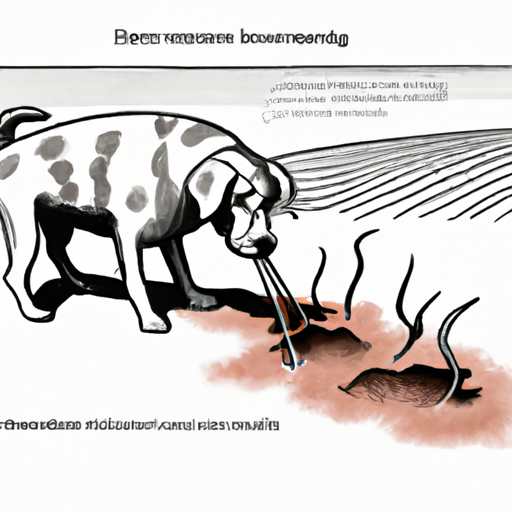Understanding Hookworms
As a caregiver, it’s crucial to understand the threat that hookworms pose to your canine companion. Hookworms are parasitic worms that feed on the blood of their host. They are tiny, only about 1/8 inch long, but they can wreak havoc on a dog’s health.
There are three common types of hookworms that affect dogs:
1. Ancylostoma caninum – the most dangerous type to dogs
2. Ancylostoma braziliense
3. Uncinaria stenocephala
The Life Cycle of Hookworms
Understanding the life cycle of hookworms can help you comprehend how they are transmitted.
The life cycle of hookworms is as follows:
- A dog ingests hookworm larvae, either through contaminated soil or by eating an infected prey animal.
- The larvae reach the intestines and mature into adult hookworms.
- Adult hookworms lay eggs, which pass out of the dog’s body in the feces.
- The eggs hatch into larvae in the environment, where they wait for a new host to infect.
Transmission Routes
Now, let’s look at the various ways your dog can get infected by hookworms.
-
Larval Penetration: The most common way dogs get infected with hookworms is through contact with contaminated soil. The larvae can penetrate the skin and eventually end up in the dog’s intestines.
-
Oral Ingestion: Dogs can also ingest hookworm larvae by eating contaminated soil or licking contaminated fur or paws.
-
Mother to Pup: Hookworms can be transmitted from a mother dog to her puppies through the milk.
-
Consuming Infected Prey: Dogs can get infected by eating another infected animal, such as rodents.
Symptoms and Treatment of Hookworms
As a caregiver, it’s important to know the symptoms and treatments of hookworms. The symptoms can vary depending on the age and health of your dog.
| Symptoms | Description |
|---|---|
| Diarrhea | Often dark and tarry |
| Weight loss | Due to lack of nutrients |
| Anemia | Seen as pale gums and lethargy |
| Poor growth | In puppies |
If your dog is showing these symptoms, it’s important to consult with a veterinarian. The vet may prescribe deworming medications to kill the hookworms. Remember to administer the full course of medication to ensure all the hookworms are eliminated.
Preventing Hookworms
Prevention is always better than cure. Here’s what you can do to protect your dog:
- Regularly clean up your dog’s feces.
- Keep your dog’s living area clean and free of feces.
- Regular deworming as advised by your vet.
- Prevent your dog from eating rodents or other potentially infected animals.
Frequently Asked Questions
Q: Can humans get hookworms from dogs?
A: Yes, humans can get a certain type of hookworm from dogs, but it’s rare.
Q: Can I prevent my dog from getting hookworms?
A: Yes, by keeping your dog’s living area clean and following a regular deworming schedule.
Q: How often should I deworm my dog?
A: Consult with your vet, but generally, puppies should be dewormed every two weeks and adult dogs at least twice a year.
Q: What if my dog has already been infected with hookworms?
A: Consult with a vet immediately for treatment options. Your dog will likely need to be treated with deworming medication.



